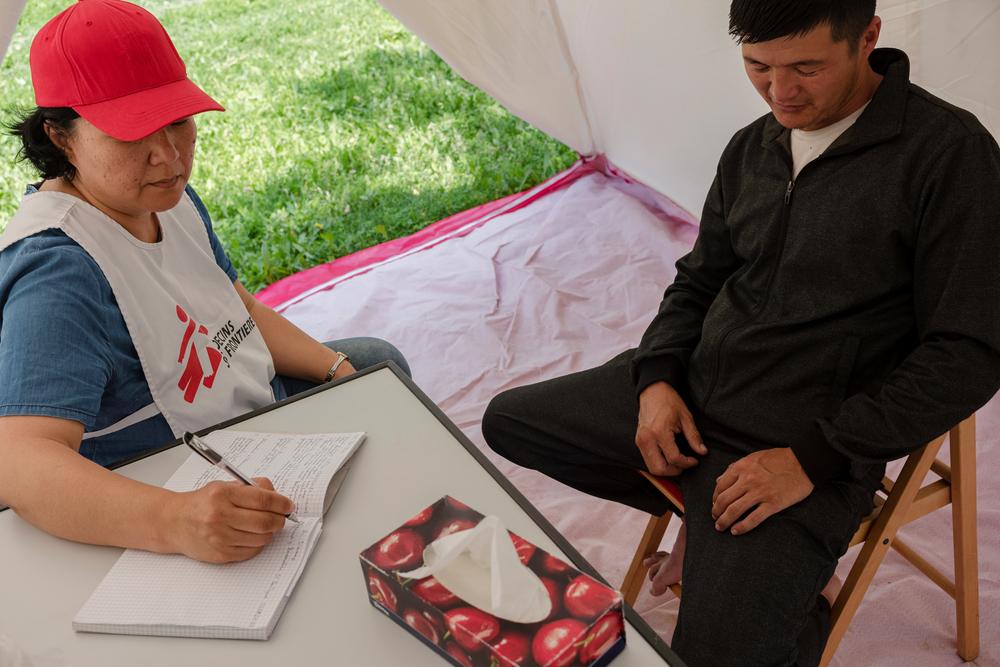Violent clashes, including exchanges of fire, took place between Kyrgyz and Tajik armed forces in late April this year, displacing at least 30,000 people in Batken and Leilek districts of Kyrgyzstan. Many have returned since, but others still remain displaced. The clashes left many in shock who suddenly found their normal lives violently disrupted. Immediately after the clashes, MSF teams started providing basic health care and psychosocial consultations to affected populations.
After four months of addressing critical needs, MSF is now phasing out its activities. But reconstruction needs still remain including the need to rebuild schools and hospitals that were destroyed during the clashes. Marcos Matías Moyano, MSF’s Mental Health Advisor, was in Kyrgyzstan recently to support the organisation’s response and he explains how the clashes have impacted peoples’ lives.
What is the situation in the Batken and Leilek districts of Kyrgyzstan?
Following the April clashes, which caused widespread destruction in the border areas of Kyrgyzstan, people are gradually recovering from the initial shock. Even though this part of Kyrgyzstan has experienced tensions over land use and water in the past, the recent clashes came as a surprise to many of the residents. At the time of my visit, people in the clashes-affected areas were showing many expected signs of distress. With manifestations such as constant worries, anxiety, fear, sleep disturbances as well as changes in appetite and irritability.
Many have heard gunshot noises or explosions, have had to flee or were evacuated in a hurry. These situations can leave a lasting impact, particularly on children. A few also directly witnessed their relatives or neighbors being killed or injured during the clashes; others saw their houses destroyed, their personal items looted, and their businesses burned.
Several public facilities such as a health center and schools were also burned and destroyed, which makes resuming normal lives that much difficult until services are fully restored.
How is MSF responding to the needs of people affected by the clashes?
MSF’s initial response immediately after the clashes focused on Batken city, where many of the displaced people had sought refuge. But as people started returning, the attention shifted to rural areas of Leilek district, where public health services had been particularly affected during the clashes. MSF teams focused on providing basic health care and psychological consultations in villages around Kolundu and Samarkandek hospitals as well as in two camps for displaced people.
Many people are presenting adverse mental health reactions and our psychologists are helping them cope and re-adjust. There are also many people with prior mental health conditions, which have been further exacerbated by clashes. These people are also benefiting from MSF’s psychological consultations.
Since the start of the response, MSF has provided over 4,100 basic health care consultations and conducted close to 900 counselling or psychotherapeutic sessions.
At the same time, the community structure is strong, and people have been supporting each other. The response from the local administration and civil society organisations has also been robust.
There is often stigma associated with seeking mental health care. Are people refraining from seeking care, which could mean that the extent of the problem is higher than what is reported?
We found that at least 60 percent of the people coming to seek psychological consultations were doing so because of problems they were already experiencing even before the clashes. The clashes only added to their distress resulting in deterioration of these conditions.
This highlights two key aspects: the first one is that mental health needs were unmet in these areas and, the second is that, contrary to expected mental health stigma, people were in fact, very willing to receive mental health care by professionals at health facilities.
What other issues have you observed in your assessment?
The distress that many people have experienced is a normal reaction in a situation like this. With time, most of them will recover. Only a few will go on to develop post-traumatic stress disorder and will require more specialized care.
What is also needed beyond addressing the immediate needs is rapid reconstruction of damaged infrastructure including schools and hospitals, especially of houses before the winter arrives. As long as the environment remains scarred with the impact of conflict, people will find that much difficult to resume their normal lives.
In my discussions, several people also raised the need to have better emergency aid response capacity including more ambulances as well as swifter medical evacuations, should such incidents recur in the future.
